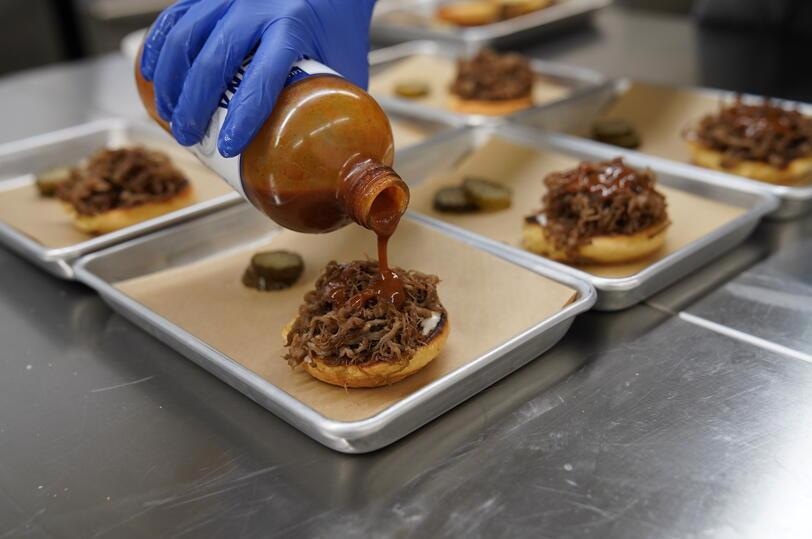There are a number of reasons why switching from meat to plant-based alternatives makes sense, from climate change to sustainability, personal health and diet, as well as moral grounds. Whatever the reason may be, there is a growing demand for meat alternatives in today’s global food market.
 Image Credit: Courtesy of Tender Food / Goisman, M., (2022) Making steak from vegetable protein. [online] Seas.harvard.edu. Available at: https://www.seas.harvard.edu/news/2022/03/making-steak-vegetable-protein
Image Credit: Courtesy of Tender Food / Goisman, M., (2022) Making steak from vegetable protein. [online] Seas.harvard.edu. Available at: https://www.seas.harvard.edu/news/2022/03/making-steak-vegetable-protein
Now, a group of researchers from Harvard’s John A. Paulson School of Engineering and Applied Sciences has developed a new technology that can spin plant-based protein fibers to mimic the texture of meat, including pulled pork and steak.
The team has also taken the next step and launched an alternative meat start-up, Tender Food, backed with around 12 million USD in equity funding led by Lowercarbon Capital.
The process developed by the Tender Food team aims to closely simulate the texture of meats for consumers of plant-based diets.
The fibers’ texture is very important to the eater’s perception that they’re eating meat.
Kit Parker, the Tarr Family Professor of Bioengineering and Applied Physics at the John A. Paulson School, Harvard
Parker’s innovation came after looking for people to collaborate with on a project creating meat alternatives from vegetable proteins, using a technology initially developed to produce nanofiber wound dressings and body armor.
Christophe Chantre joined Parker after becoming increasingly interested in exploring the limits of biology and biomedical engineering and how these could be brought together to address climate and sustainability issues.
Rotary Jet-Spinning Technology
While Parker had been thinking about how to develop effective meat alternatives for some time, it was this project, developing a new approach to Rotary Jet-Spinning, that really got the gears turning.
Throughout the Rotary Jet-Spinning process, a liquid polymer solution is poured into a reservoir, then expelled through a tiny aperture that uses centrifugal force; as the device spins the polymers are spun out into fibers.
We were making nanofibers out of everything from lemongrass to soy to alfalfa.
Kit Parker, the Tarr Family Professor of Bioengineering and Applied Physics at the John A. Paulson School, Harvard
Parker’s lab received plenty of backing on the project from the start as funding came in from all directions, including the TomKat foundation.
Moreover, the Physical Sciences and Engineering Accelerator, an initiative of the Harvard Office of Technology Development (OTD), was able to provide a grant to help scale up the technology.
Another exciting development of the project is that the researchers were able to synthesize customizable heart valves which can be implanted with minimal surgical invasiveness.
“Those first demonstrations were impressive,” said Alan Gordon, Director of Business Development in the Harvard OTD.
At the time, we were talking about using it for surgical implants, wound healing, and military body armor, which are all still on the table. Over time, they also identified an opportunity to make a difference with sustainable, ethical food, and it’s been exciting to help them launch Tender to bring it to market.
Alan Gordon, Director of Business Development in the Harvard OTD
Good for the Climate and Taste Buds
As Parker and Chantre fine-tuned their method, they were able to find that they could use the technology to create gelatin scaffolds to hold animal cells, thereby producing lab-grown meat.
However, the pair were more interested in producing meat-free alternatives leading them down the path of pinning muscle fiber using plant-based proteins to create products that have the same qualities and textures of pulled pork and steak but, in fact, contain no animal derivatives.
The team’s success was measured by the excellent taste of their product, which convinced the pair that Tender Food was a viable success. In fact, Parker is able to add Kansas City Barbeque Society certified judge to his resumé, proving the validity of the product's great taste.
Alternative meat products could help address some of the key concerns surrounding meat consumption in today’s era of climate change, as roughly 15% of carbon emissions are a result of the meat industry. Tender food aims to address these statistics while also convincing a meat-eating population that meat-free alternatives are just as delicious.
References and Further Reading
Goisman, M., (2022) Making steak from vegetable protein. [online] Seas.harvard.edu. Available at: https://www.seas.harvard.edu/news/2022/03/making-steak-vegetable-protein
Disclaimer: The views expressed here are those of the author expressed in their private capacity and do not necessarily represent the views of AZoM.com Limited T/A AZoNetwork the owner and operator of this website. This disclaimer forms part of the Terms and conditions of use of this website.